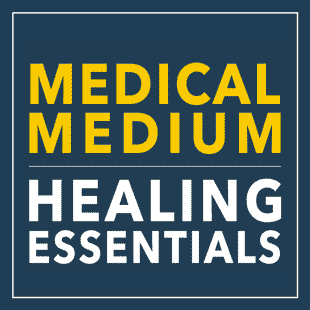Watch: Veggie Fries

Veggie Fries
The aromatic herbs oregano, rosemary, sage, and thyme possess complementary qualities. Each has a different specialization, and when you consume them all on a regular basis (whether in diet, supplementation, or a combination), their disease-fighting phytochemical compounds and extremely high levels of a broad spectrum of minerals provide a well- rounded, powerful defense against the pathogenic world. (Parsley is another aromatic herb covered in this book, and it gets its own feature, because it’s more of an individual.)
Aromatic herbs get much of their power from being very close to wild, even when cultivated. They need very little care to establish themselves and thrive; when they’re neglected, they’re still able to miraculously get what they need to pro- vide you with the high levels of nutrients you need. It is unknown to scientific communities that aromatic herbs release an antifungal compound from their roots that earthworms love. The roots of aromatics become a gathering place for earthworms, as the worms ingest this antifungal to keep themselves healthy. In return, the earthworms aerate the soil around the roots and leave behind a rich fertilizer that can’t be matched. This symbiosis is what gives aromatic herbs their unique healing properties. (If you grow these herbs in pots, or if you don’t have earthworms in your garden, make sure you use a mineral solution and enough organic fertilizer.)
Here’s a closer look at each of these stand-out aromatics:
Oregano: Amazing for killing off unproductive bacteria such as H. pylori, Streptococcus, and E. coli, which minimizes the possibility of SIBO, peptic ulcers, strep throat, ear infections, and sinusitis. Oregano oil is an incredible antibacterial, especially for killing off the E. coli that causes diverticulitis and diverticulosis. It’s also effective against ringworm.
Rosemary: Another antibacterial, rosemary specializes in fighting antibiotic-resistant bacteria, such as those that take hold in hospitals. Bringing this herb into your diet is a game changer if you’re dealing with the sorts of bacteria (such as C. difficile and multi-drug-resistant Staphylococcus aureus, or MRSA) that can result in conditions such as megacolon, severe infection, and can even lead to death.
Sage: This herb’s nature is geared toward fighting fungus. Consuming sage is wonderful for healing fungal infections such as athlete’s foot and jock itch from the inside out, as well as tackling mutant strains of fungus in the intestinal tract. If you’ve been exposed to toxic mold, turn to sage to help detoxify. Also, sage helps remove toxic heavy metals from the intestinal tract.
Thyme: This antiviral’s main job is to destroy viruses such as the flu, enteroviruses, norovirus, and the whole gamut of herpetic viruses that are responsible for autoimmune disease and Lyme disease. (For more on Lyme, see the extensive chapter on the subject in my first book.) Thyme’s ability to cross the blood-brain barrier makes it a secret weapon against viruses that have started to attack the brain or spinal cord, resulting in neurological conditions.
CONDITIONS
If you have any of the following conditions, try bringing aromatic herbs into your life:
H. pylori infection; Streptococcus infection; E. coli infection; small intestinal bacterial overgrowth (SIBO); peptic ulcers; strep throat; ear infections; sinusitis; diverticulitis; diverticulosis; ringworm; megacolon; C. difficile infection; MRSA; influenza; enteroviruses; norovirus; Epstein-Barr (EBV)/mononucleosis; cytomegalovirus (CMV); Lyme disease; all Lyme disease cofactors (including Borrelia, Bartonella, Babesia, and mycoplasma); respiratory infections; gum infections; tinnitus; vertigo; cholera; sciatica; fibromyalgia; chronic fatigue syndrome (CFS); lupus; psoriatic arthritis; multiple sclerosis (MS); shingles; rheumatoid arthritis (RA); edema; migraines; herpes simplex 1 (HSV-1); herpes simplex 2 (HSV-2); HHV-6; HHV-7; HHV- 8; HHV-9; the undiscovered HHV-10, HHV-11, and HHV-12; shingles; pelvic inflammatory disease (PID); B cell disease; bacterial infections; eye infections; ammonia permeability
SYMPTOMS
If you have any of the following symptoms, try bringing aromatic herbs into your life:
Stomachaches, food allergies, abdominal pain, dizziness, fatigue, discharge (e.g., vaginal or from the eyes), flatulence, nausea, cough, anxiousness, itching, blisters, rashes, headaches, anal itching, mold exposure, all neurological symptoms (including tingles, numbness, spasms, twitches, nerve pain, and tightness of the chest), appendix inflammation, blisters, bladder pain, balance issues, clogged ears, congestion, ear pain, excess mucus, fever, jaw pain, neuralgia
EMOTIONAL SUPPORT
In the stressful times we live in, it’s understand- able when emotional reactions are heightened. When heightened emotional response becomes chronic, though, and you can’t get yourself out of a cycle of overreacting, turn to oregano, rosemary, sage, and thyme. These herbs help break the cycle of feeling consistently overstimulated, so that you can take what comes on more of an even keel.
SPIRITUAL LESSON
These aromatic herbs have been around in one form or another, one species or another, since the beginning of humankind. All this time, they’ve been right there beside us, adapting along with the changing world so that we can adapt, too. Oregano, rosemary, sage, and thyme are important teachers this way—they remind us of who we are and who we can become. What else in your life, whether a longtime hobby or long term relationship, can you always count on to cut out the distractions and connect you back with your most essential self?
TIPS
* Remind yourself to use these aromatic herbs in your daily cooking. Experiment with how many of your mainstay dishes can bene t from a sprinkle of oregano, rosemary, sage, and thyme.
* Try incorporating the essential oils of these herbs into your daily life for cleansing of mind, body, and soul. For example, add essential oil of rosemary to a bath to ignite the water’s purification process.
HERB-BATTERED ROOT VEGETABLE FRIES
These may be the best veggie fries you’ll ever eat. The trick is to boil the root vegetables and then shake them vigorously before baking. The herbs and garlic generously coat the outside and the smudged edges will turn crispy in the oven. If you’re pressed for time, you can omit the extra steps and send them straight to the oven, though those few extra minutes will yield truly amazing results. Make a big enough batch to share—these won’t last long!
- 3 pounds assorted root vegetables (such as potatoes, sweet potatoes, parsnips, carrots, and celery root)
- 2 tablespoons coconut oil
- 1 teaspoon sea salt
- 2 tablespoons finely minced garlic
- 1 tablespoon each finely minced sage, oregano, rosemary, and thyme
Preheat the oven to 400°F. Peel and slice the root vegetables into “fries.” Transfer the vegetable fries to a large pot, cover with water, and bring to a boil. Boil the fries for 5 to 7 minutes, until just cooked through but not soft. (Watch carefully so as not to overcook.)
Drain the water. Add the coconut oil, sea salt, garlic, and herbs to the fries and stir briefly. Cover the pot and shake vigorously until the fries are well mixed with their edges slightly mashed.
Line a baking tray with parchment paper. Arrange the fries on the tray so none are overlapping. Place in the oven and bake for 20 to 25 minutes, flipping once halfway through. Remove when the edges turn golden and crispy.
Makes 3 to 4 servings
Excerpt from #1 New York Times Bestselling book Life-Changing Foods
This item posted: 16-Oct-2016
The information provided on this Site is for general informational purposes only, to include blog postings and any linked material. The information is not intended to be a substitute for professional health or medical advice or treatment, nor should it be relied upon for the diagnosis, prevention, or treatment of any health consideration. Consult with a licensed health care practitioner before altering or discontinuing any medications, treatment or care, or starting any diet, exercise or supplementation program. Neither Anthony William nor Anthony William, Inc. (AWI) is a licensed medical doctor or other formally licensed health care practitioner or provider. The content of this blog and any linked material does not necessarily reflect the opinions of Anthony William, AWI or the principal author, and is not guaranteed to be correct, complete, or up to date.
Thanks for printing this post. For more, visit www.medicalmedium.com


